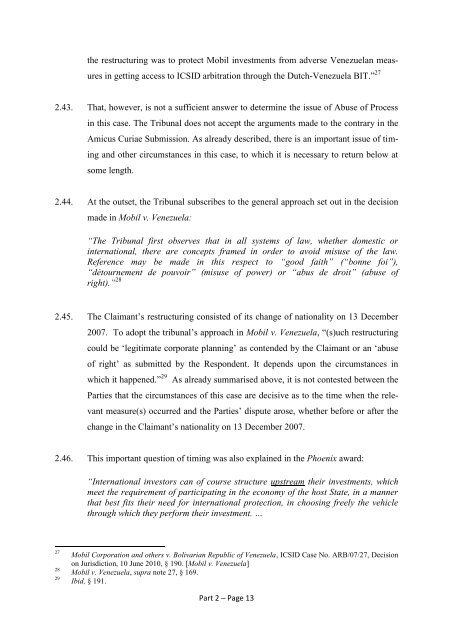brought under the dominican republic - central america - ita
brought under the dominican republic - central america - ita
brought under the dominican republic - central america - ita
Create successful ePaper yourself
Turn your PDF publications into a flip-book with our unique Google optimized e-Paper software.
<strong>the</strong> restructuring was to protect Mobil investments from adverse Venezuelan measures<br />
in getting access to ICSID arbitration through <strong>the</strong> Dutch-Venezuela BIT.” 27<br />
2.43. That, however, is not a sufficient answer to determine <strong>the</strong> issue of Abuse of Process<br />
in this case. The Tribunal does not accept <strong>the</strong> arguments made to <strong>the</strong> contrary in <strong>the</strong><br />
Amicus Curiae Submission. As already described, <strong>the</strong>re is an important issue of timing<br />
and o<strong>the</strong>r circumstances in this case, to which it is necessary to return below at<br />
some length.<br />
2.44. At <strong>the</strong> outset, <strong>the</strong> Tribunal subscribes to <strong>the</strong> general approach set out in <strong>the</strong> decision<br />
made in Mobil v. Venezuela:<br />
―The Tribunal first observes that in all systems of law, whe<strong>the</strong>r domestic or<br />
international, <strong>the</strong>re are concepts framed in order to avoid misuse of <strong>the</strong> law.<br />
Reference may be made in this respect to ―good faith‖ (―bonne foi‖),<br />
―détournement de pouvoir‖ (misuse of power) or ―abus de droit‖ (abuse of<br />
right).‖ 28<br />
2.45. The Claimant‟s restructuring consisted of its change of nationality on 13 December<br />
2007. To adopt <strong>the</strong> tribunal‟s approach in Mobil v. Venezuela, “(s)uch restructuring<br />
could be „legitimate corporate planning‟ as contended by <strong>the</strong> Claimant or an „abuse<br />
of right‟ as submitted by <strong>the</strong> Respondent. It depends upon <strong>the</strong> circumstances in<br />
which it happened.” 29 As already summarised above, it is not contested between <strong>the</strong><br />
Parties that <strong>the</strong> circumstances of this case are decisive as to <strong>the</strong> time when <strong>the</strong> relevant<br />
measure(s) occurred and <strong>the</strong> Parties‟ dispute arose, whe<strong>the</strong>r before or after <strong>the</strong><br />
change in <strong>the</strong> Claimant‟s nationality on 13 December 2007.<br />
2.46. This important question of timing was also explained in <strong>the</strong> Phoenix award:<br />
―International investors can of course structure upstream <strong>the</strong>ir investments, which<br />
meet <strong>the</strong> requirement of participating in <strong>the</strong> economy of <strong>the</strong> host State, in a manner<br />
that best fits <strong>the</strong>ir need for international protection, in choosing freely <strong>the</strong> vehicle<br />
through which <strong>the</strong>y perform <strong>the</strong>ir investment. …<br />
27<br />
28<br />
29<br />
Mobil Corporation and o<strong>the</strong>rs v. Bolivarian Republic of Venezuela, ICSID Case No. ARB/07/27, Decision<br />
on Jurisdiction, 10 June 2010, § 190. [Mobil v. Venezuela]<br />
Mobil v. Venezuela, supra note 27, § 169.<br />
Ibid, § 191.<br />
Part 2 – Page 13

















